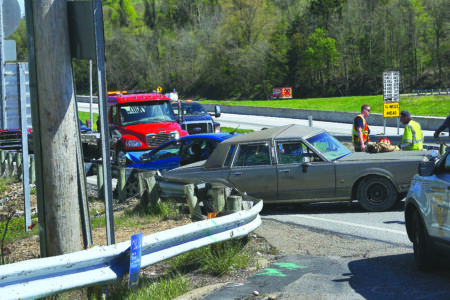Red Cross in need of volunteers

Photo Provided Belmont County Commissioners Josh Meyer, left, and J.P. Dutton, right, welcome Sharon Kesselring, executive director of the American Red Cross of Belmont County Wednesday and recognize American Red Cross Month. Kesselring said the Red Cross is on the lookout for volunteers to help people in need after disasters.
ST. CLAIRSVILLE — The American Red Cross is seeking helpers to aid those in need.
The Belmont County Board of Commissioners officially recognized American Red Cross Month on Wednesday. Sharon Kesselring, executive director of the American Red Cross of Belmont County, attended the board’s meeting and said American Red Cross Month is a chance to celebrate the work of volunteers and to raise awareness of the need for blood donations.
“The Belmont County commissioners were very gracious in recognizing American Red Cross Month,” she said.
She reviewed her organization’s activities in 2022, including emergency responses, education and preparedness, as well as training services for activities such as CPR and first aid.
Kesselring said the Red Cross relies on volunteers for response to emergencies.
“One number that came in a little less than I’d like to see right now are the number of volunteers that we have in Belmont County, especially volunteers for our local disaster action team,” she said, describing them as people who are willing to take the training and respond to disasters such as fires, floods and storms.
“We have several volunteers that have signed up with blood services, but not as many volunteers that have signed up with disaster services, so I would definitely put in a plea for additional volunteers,” Kesselring said.
For Disaster Action Team members, people who register as volunteers will undergo a background check paid for by the Red Cross.
“We immediately get them talking with the supervisor of that department, who explains what types of training we would have them do. That training’s virtual, it’s all online, so they can do it at their time convenience. And once they have completed the training online, we have them do ride-alongs with our current disaster volunteers so they get a feel for what it is we’re doing and how we respond,” she said.
“We respond 24/7, so a volunteer has to take that into consideration when they’re willing to be a disaster action team member. We ask for people to sign up for a week at a time, so maybe you would do a week for March, a week for April, a week for May,” Kesselring said.
“Volunteers are very important to us, and making sure a volunteer not only has an appropriate experience with us but a fulfilling experience to their liking is very important. We train them up, and once they understand what they’re doing, we release them to be members of our disaster action team,” she said.
“They would meet with the clients, quite often at the scene of, for instance, a home fire,” she said, adding volunteers also meet the clients afterward at less stressful times. Volunteers also work in teams with a partner.
“When they determine their immediate emergency needs, they immediately offer them comfort and their immediate emergency needs may include the need for shelter, the need for clothing, the need for food,” she said. “Once we determine what their immediate emergency needs are, we’re able to provide direct financial assistance to that client.”
Kesselring said other volunteers can then help with recovery. This is usually conducted virtually, with volunteers following up with clients and possibly referring them to other agencies.
Volunteers help clients understand “that they’re able to move on from that devastation that they’ve experienced,” she said.
Regarding the blood supply, she said there is a need for O positive, the most common blood type that can be given to anyone with a positive blood type, and O negative, the “universal” blood type that can be given to anyone.
“We’re not in a critical state at this time, but we’re definitely not at a stable level of two specific types of blood,” she said. “We would like to see more activity at our blood drives, but especially people that have O positive and O negative type blood, that they would sign up and give blood locally.”
Kesselring said volunteers often work in blood drives.
“They can work at different bloodmobiles in the area, and that’s their choice,” she said. “There’s a little bit of training involved. Nothing very complicated. They choose their date and time. Even helping to work at one blood drive a month will be a big help to us.”
To learn more, donate or volunteer, people can visit redcross.org or call 304-488-5279.





